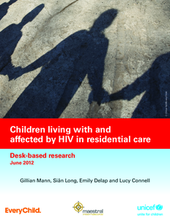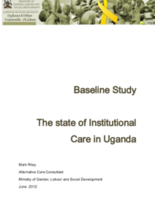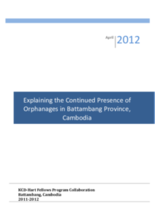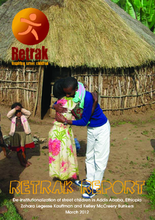Displaying 1281 - 1290 of 1510
This paper focuses on appropriate responses to the unique challenges faced by young people at risk who are transitioning out of state care in South Africa.
Virginia Commonwealth University Professors, Karen Smith Rotabi and Rosemary Farmer, examine impact of neglect on brain development in their recent podcast, Orphaned and Vulnerable Children and Brain Development. Through the persepective of the intersection of neuroscience and social welfare practice, Farmer and Rotabi examine how poverty of experience and such potential adverse situations as institutionalization disrupt brain development in babies and young children.
In this video, film-maker Kate Blewett finds out what a lifetime in the care of the state really means for Ukraine's forgotten children.
Desk review of existing literature and research to track the extent to which the HIV pandemic has been a driver of growth in children’s residential care and the situation of HIV affected children in care.
This video showcases the Family-based care program of Save the Children and its partners in Indonesia.
The People’s Republic of China issued its third and fourth combined report on the implementation of the Convention on the Rights of the Child in June 2012. This extract of the report focuses on sections relevant to children's care and in particular those addressing Family Environment and Alternative Care
This document summarises the key findings of the project to-date and the current status of the child care and alternative care directory. It also outlines some key activities that need to be undertaken for the MoGLSD to start to address the issues outlined within the report. The MoGLSD has carefully evaluated the baseline study and after a number of consultations wish to put forward this document as a proposal to address the serious issues of children without parental care and the growing number of children’s homes.
This qualitative research study seeks to better understand some of the reasons for residential care expansion in the province of Battambang, Cambodia. The study aims to identify why children are sent to orphanages and understand the attitudes of those stakeholders who are influencing the rise in institutions in the province.
The study was carried out in Addis Ababa, Ethiopia. The purpose of this research is to utilise information collated from literature review as well as informant interviews and focus group discussions to identify good practices or help inform the development of such practices aimed at assisting street children currently residing in institutional care to return to a family-based environment.
The Deinstitutionalization Toolkit is designed to provide all those interested in institutional closures and expanded community living opportunities for people with intellectual disabilities and developmental disabilities (ID/DD) with information, strategies, state data, and case studies that can facilitate closure and build community capacity to serve more people with ID/DD in the community. It covers topics such as building a broad-based coalition, understanding and working within the political environment, creating a community system of care, and relevant laws, policies, and court decisions.





